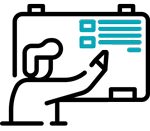Hinter allen Prozessen stehen Menschen – die Spezialisten, von denen die Effizienz eines Unternehmens abhängt. Dank unserer hochwertigen Trainings, Workshops und Coachings sind unsere Kunden in der Lage, die in ihren Unternehmen vorhandenen Potenziale besser zu nutzen. Unsere Kurse eröffnen viele neue Möglichkeiten und unsere Unterstützung hilft bei der Lösung bestehender Probleme. Unsere Schulungen entwickeln die zwischenmenschlichen und persönlichen Fähigkeiten der Mitarbeiter. Sie tragen dazu bei, die Probleme zu verstehen, die sich aus schlechter Kommunikation ergeben, und verbessern die Teamarbeit, was zu einem stärkeren Engagement und einer besseren Integration der Mitarbeiter und letztlich zum Erfolg des Unternehmens beiträgt.

Die von uns angebotenen Schulungen werden von Anfang an so konzipiert und durchgeführt, dass sie den Gegebenheiten in Ihrem Unternehmen entsprechen. Deshalb beginnen wir unsere Zusammenarbeit immer mit einem gründlichen Verständnis der Quelle des Schulungsbedarfs. Nach Abschluss der Schulung geben wir dem Kunden ein Feedback (einen Bericht über die Bewertung der Schulung und Empfehlungen für weitere Entwicklungsmaßnahmen). Die von uns angebotenen Schulungen ermöglichen es Ihnen, Fachkenntnisse zu erwerben oder zu vertiefen, die für die Entwicklung Ihres Unternehmens unerlässlich sind.
Wir gehen davon aus, dass eine gute Schulung die Motivation der Mitarbeiter stärkt, ihre Arbeitsmethoden und -standards zu ändern. Deshalb bieten wir neben der Schulung selbst auch Unterstützung bei der Umsetzung neuer Fähigkeiten, Kenntnisse und Standards.

Hochwertige Ausbildung

Eigenes Schulungszentrum

Qualifizierte Trainer/Praktiker

Maßgeschneiderte Schulungen entsprechend den Kundenanforderungen

Klare und verständliche Schulungsunterlagen
Nachschulungs-Coaching

Bescheinigung über die Teilnahme an der Schulung

Flexibilität bei der Wahl des Schulungsortes – im Freien, am Firmensitz oder im invenio-Schulungszentrum

Moderne Trainingsmethoden
Theory and explanation of standardised symbolism. Methodology for measuring and collecting process information always on process (Gemba). Creating a map and how to read it. The 7 types of Muda, where they come from, their risks and costs. How to find muda in processes and how to reduce them.
Genesis and history of Kaizen. Practical benefits of implementation and application in the short and long term. Tools and worksheets and methodology for accounting and cost/profit calculation, motivation and reward.
The direction of the purchasing department and its impact on company costs. Relating Lean to the activities of the purchasing department by presenting the main costs and the main areas of waste. The right definition of the company’s needs: ‘Right The First Time’. Definition of price target, product analysis, manufacturing process, standardisation. Analysis and selection of suppliers. Supplier selection. Discussion of the importance of costing. Theory + workshops.
Presentation of a standard for the visualisation of management by team leaders and managers in their production areas. Presentation of the structure of the functions in the area, responsible for improving safety, sost and loss distribution, workplace organisation.
Origins and application of 5S. Explanation of the differences with the colloquial term 5S: Clean Up Your Mess Yourself. Preparation and implementation of a 5S implementation plan and regular audits to confirm the level of implementation of the plan. KPIs relevant to the plan.
IATF achievement and maintenance principles. Definition of production unit, remote location and extended production unit. Overview of customer requirements against IATF 16949. IATF 16949- requirements of the standard. MAQMSR- discussion of IATF minimum requirements for the automotive supply chain. (Workshop for auditors- as a training option).
To learn about the structure and content of ISO 9001: 2015. To learn about issues/extend knowledge of the organisation’s context, stakeholder needs and expectations. To learn the differences between ISO 9001:2025 vs. ISO 9001:2008. (Auditor workshop- like training option).
Training for internal management system auditors according to ISO 19011 standard. Audit as a management system improvement tool.
Concept of quality. Responsibility for quality. Concept of process. What is a management system. Corrective versus preventive action. ISO 9001 standard.
Introduction to the 8-D methodology. Discussion of a sample 8-D report. (Workshop optional).
Can we reliably identify the cause of a problem? Are we getting to the real cause of problems, or are we sweeping problems under the carpet to temporarily have peace of mind? This training will help you acquire the practical skills to get to the real sources of a production problem by means of analysis and verification methods. The training will allow you to verify your ability to apply what you have learnt by carrying out exercises during the training, as well as an individual project.
Workshop on theory and tools (PDCA, Gemba, F&F-Facts and Figures, 5xWhy), cost analysis, Delphi method, Ishikawa diagram, brainstorming, solution choices matrix, Gantt chart). Explanation of the concept and necessity of Obeya, Jishuken Groupy. Case study on a problem brought by the participants. It teaches analytical thinking, fact finding and systematic problem solving. It sensitises to pitfalls and common mistakes. The result is the preparation of several practical solutions/changes, the benefits of which always exceed the cost of the training.
A key tool for describing and solving problems to be used by any manager, supervisor, engineer or specialist. It teaches how to logically organise and describe tasks and problems. Exercises during training and an individual project.